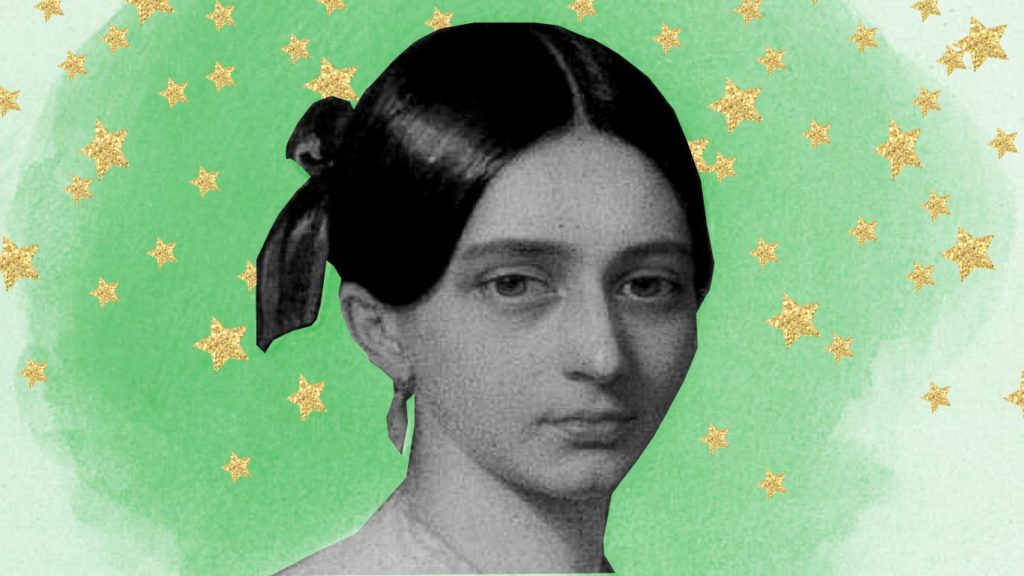
The pages of classical music history are littered with the stories of prodigies. Mozart playing by ear at age 4, Beethoven’s debut at 7, Bizet entering conservatory at 10. Clara Wieck Schumann, who started piano lessons at 5, almost seems like she began late. But her debut at age 9 and her first international tour at 12, combined with the longevity and breadth of her 61-year performing career, has left her with a lasting influence over the art of piano playing.

Piano may have been embedded in the genes of Clara Wieck from birth. Both of her parents were pianists. Friedrich Wieck was a domineering piano pedagogue, even dictating what young Clara should write in her diary. He passed along a sense of the music business that served Clara well for her entire career. Her mother, Marianne Bargiel, performed at the Leipzig Gewandhaus concert hall throughout her marriage to Friedrich Wieck and the birth of all five of her children.
Madamigella Clara Wieck
Young Clara Wieck was withdrawn and did not speak until the age of 4. She was only 5 when her parents divorced, and as one of the eldest children she remained in her father’s household. This led to a carefully managed debut and start to her career. Her father arranged for her to meet Nicolo Paganini when the famed violinist visited Germany. After playing for him, Paganini told her that music would be her vocation because she “had feeling.” She was invited to watch his recitals from on stage, and on his way out of town he wrote her a short line of music, inscribed, “al merito singolare di Madamigella Clara Wieck” (“To the singular merit of Clara Wieck”). A notated tip of the hat, from one virtuoso to another.
Throughout her youth, Clara Wieck maintained a regimen of two hours of practice every day plus lessons in playing and theory, a schedule carefully planned by her father. After her first tour, she began writing her piano concerto, which she premiered at age 16. This came alongside remarkable virtuosic recitals, played entirely from memory, and tours with famed violinist Joseph Joachim. In fact, Clara earned an international reputation far before her eventual husband, fellow Friedrich Wieck student Robert Schumann. Early on, an admiring professor wrote, “I believe that she is ordained to make the art of music still more sublime.”
As a young touring concert pianist, Clara Wieck was admired for her dazzling technical ability. As she grew older, she also earned praise for her expressiveness and musicianship. Friedrich Wieck had sought to create a complete musician in Clara, and she had exceeded his expectations.
Through correspondence and later reconciliation, Marianne Bargiel was able to maintain a connection with her daughter. As a piano virtuoso, Bargiel was devoted to her less professionally successful second husband, and was eventually able to support her family through her own performing and teaching after her husband’s early death. Her life paralleled her daughter’s so strikingly that it’s a wonder that Marianne isn’t considered more often as a major player in Clara’s career.
Clara the Composer
“There is nothing greater than the joy of composing something oneself and listening to it.”
Concert pianists in the Romantic Period often made a career performing their own music. The performer was the composer, and Clara Wieck Schumann was no exception. It was in the arena of composition that Clara faced the greatest amount of gender discrimination and the trials of being a woman in a so-called man’s world. One reviewer of an early recital wrote, “If the name of a female composer were not on the title one would not think it was written by a woman.” This was one of the positive reflections. Another took note of unconventional key changes by pointing out that “women are moody.”
It’s a disparity that has not gone away. In 2018, not only were none of the top 20 works performed by major orchestras written by women, but also only one of the 10 most-booked classical pianists was a woman.
But Clara Schumann continued to compose, first with the encouragement of her father, and later with the support of her husband Robert, who said, “Clara has written a number of smaller pieces which show musicianship and a tenderness of invention such as she has never before attained.” He also conceded that while he supported her, he did not make it easy for her, saying, “Children and a husband who is always living in the realms of imagination do not go well with composition.”
Not only did the couple keep a marriage diary, alternating entries, but they even composed in the same format in their lieder setting on Liebesfrühling. We don’t know for sure the reason that she stopped composing by age 35. One could speculate on deference to her husband, the demands of caring for an ill spouse, or the distraction of eight children. A famous quote of hers bemoans that no other women have succeeded in the profession.
“I once believed that I possessed creative talent, but I have given up this idea; a woman must not desire to compose—there has never yet been one able to do it. Should I expect to be the one?”
But perhaps we ascribe too much to this one moment in her career. Rather than focusing on “ability,” look upon the word “desire.” For someone who always had the ability to do whatever she sought to do, playing or otherwise, Clara Schumann seems an unlikely candidate to admit defeat.
Schumann wrote her last piece in 1853, and three years later she lost her husband. Friends offered to play benefit concerts for her family, and she respectfully declined. Instead of retreating to household duties, this was the start of the second phase of a remarkable career.
This is Part 1 in a two-part series on the life of pianist and composer Clara Schumann. Part 2 will be available later this week.
9(MDA2NzQwOTg1MDEyOTc4NzI2MzJmNmZlZA001))